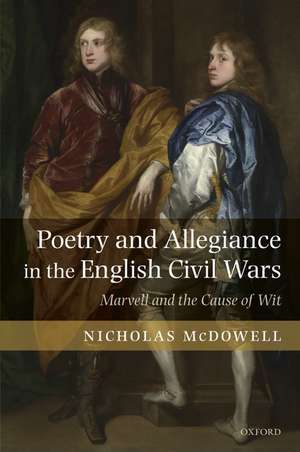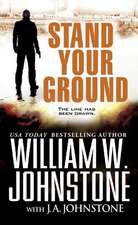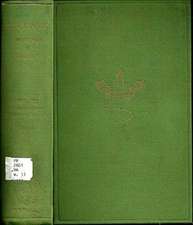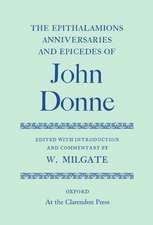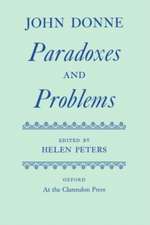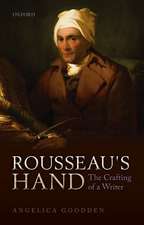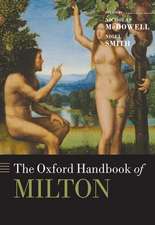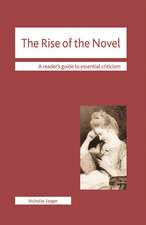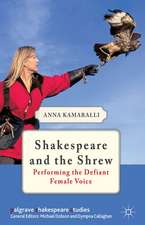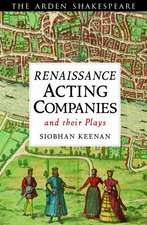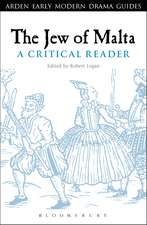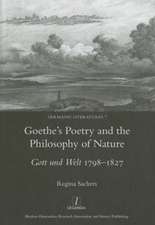Poetry and Allegiance in the English Civil Wars: Marvell and the Cause of Wit
Autor Nicholas McDowellen Limba Engleză Hardback – 20 noi 2008
Preț: 863.50 lei
Preț vechi: 1241.31 lei
-30% Nou
Puncte Express: 1295
Preț estimativ în valută:
165.28€ • 179.59$ • 138.93£
165.28€ • 179.59$ • 138.93£
Carte tipărită la comandă
Livrare economică 10-16 aprilie
Preluare comenzi: 021 569.72.76
Specificații
ISBN-13: 9780199278008
ISBN-10: 0199278008
Pagini: 306
Dimensiuni: 162 x 241 x 24 mm
Greutate: 0.64 kg
Editura: OUP OXFORD
Colecția OUP Oxford
Locul publicării:Oxford, United Kingdom
ISBN-10: 0199278008
Pagini: 306
Dimensiuni: 162 x 241 x 24 mm
Greutate: 0.64 kg
Editura: OUP OXFORD
Colecția OUP Oxford
Locul publicării:Oxford, United Kingdom
Recenzii
an excitingly speculative book about the links between poetry and politics in the seventeenth century
tells us much about the intellectual and social world in which Marvell moved... [McDowell's] imaginative reconstruction of the literary life of revolutionary England adds a profoundly important dimension to our understanding of the cultural politics of the 1640s. To read this book is to see that decade from within, to live with its poets, and to hear them sing.
Nicholas McDowell's carefully researched book...adds a great deal to our emerging sense of the complexity of political, social and cultural identity during the 1640s [and] reveals a matrix of allusion, sociability, allegiance and engagement within which our understanding of the multiplicities of Marvell's poetry can be reformulated.
McDowell's work, through exemplary research and solid conjecture... revitalizes the contextual resources of Marvell scholarship.
McDowell's methodology is certainly unique [and] succeeds comprehensively in enriching and complicating the age-old debate about Marvell's political and literary loyalties. The book is a significant contribution to the field which all subsequent investigations of Marvell's historical situation will have to contend with.
tells us much about the intellectual and social world in which Marvell moved... [McDowell's] imaginative reconstruction of the literary life of revolutionary England adds a profoundly important dimension to our understanding of the cultural politics of the 1640s. To read this book is to see that decade from within, to live with its poets, and to hear them sing.
Nicholas McDowell's carefully researched book...adds a great deal to our emerging sense of the complexity of political, social and cultural identity during the 1640s [and] reveals a matrix of allusion, sociability, allegiance and engagement within which our understanding of the multiplicities of Marvell's poetry can be reformulated.
McDowell's work, through exemplary research and solid conjecture... revitalizes the contextual resources of Marvell scholarship.
McDowell's methodology is certainly unique [and] succeeds comprehensively in enriching and complicating the age-old debate about Marvell's political and literary loyalties. The book is a significant contribution to the field which all subsequent investigations of Marvell's historical situation will have to contend with.
Notă biografică
Nicholas McDowell grew up in Belfast and was educated at Cambridge and Oxford. He was a Research Fellow of Fitzwilliam College, Cambridge, before moving to the University of Exeter in 2001. He is the editor, with Nigel Smith, of The Oxford Handbook of Milton, a collection of newly-commissioned research essays by more than 30 leading scholars to mark the quatercentenary of Milton's birth in 2008. His research in the next few years will focus on the 12-volume Oxford Complete Works of John Milton, for which he is editing The Tenure of Kings and Magistrates, Observations Upon the Articles of Peace, and Eikonoklastes. These will appear in Volume 6: Vernacular Regicide and Republican Writings in 2011. In 2007 he was awarded a Philip Leverhulme Prize by the Leverhulme Trust in recognition of the international impact of his research.
